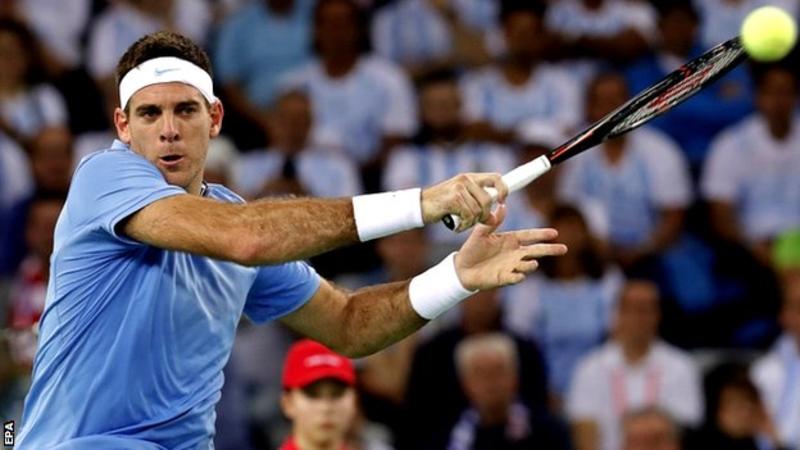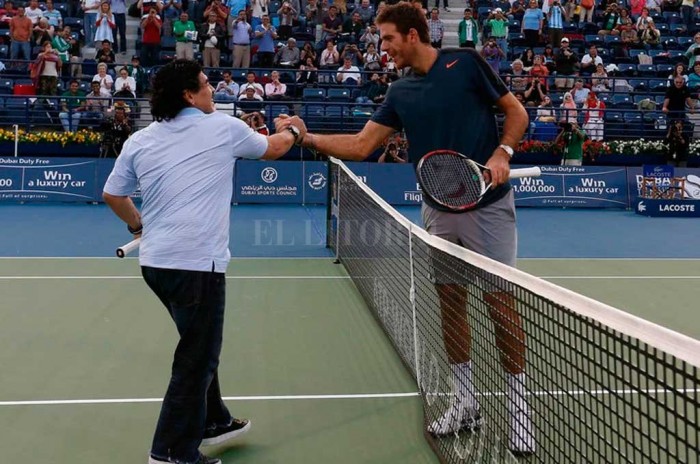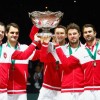At the 2010 Australian Open, the first major tournament following his breakthrough first – and unfortunately only – major singles title at the 2009 U.S. Open, Juan Martin del Potro first began to have his chronic injury problems that would derail and stunt his career.
In the first part of his introduction to his book “Juan Martin del Potro: The Gentle Giant” (for sale and download here: https://www.amazon.com/Juan-Martin-del-Potro-Gentle/dp/1937559920/ref=sr_1_1?keywords=juan+martin+del+potro+gentle+giant&qid=1672417765&sprefix=Juan+MArtin+del+%2Caps%2C111&sr=8-1 author Sebastian Torok gives readers a glimpse into the Argentine superstar at the start of his injury woes and his passion for Argentine soccer.
The shimmering hallways inside Melbourne Park look like the inner tunnels of an anthill on the opening day of the Australian Open, the first major tennis competition of the season. Tennis players, male and female, family members, trainers, promoters, journalists, ball boys, former players and security guards are all packaged together, coming and going in dizzying fashion. The scene is like a Disney park of tennis, where languages, routines, clothes and humors are mixed. It is the second half of January 2010 and Juan Martín del Potro is in Australia as the winner of the previous major singles championship at the U.S. Open four months earlier. The man from Tandil, Argentina should look radiant, excited to once again challenge the top players in men’s tennis. However, he is worried. Something is not working well with his body. His right wrist, that unleashes his powerful forehand, hurts. At times, it hurts a lot. He fears that it could be something severe (so much so that later on he would have to have surgery in the United States).
Before Juan Martín entered the locker room, he saw the author of this book, who had covered his career since he was a young player for La Nación newspaper in Argentina. Del Potro abruptly stopped and asked if what was said about his Argentine football idols. It is true?
The short tempers between Argentine football stars Martín Palermo and Juan Román Riquelme had been public for years. Their differences were irreconcilable. And many fans, lovers of the goals of the optimistic No. 9 and the exquisite technique of No. 10, refused to accept certain stories, some of them enhanced by controversy. That was, no doubt, false, but somehow it had settled. The striking thing, in the specific case of del Potro, was that in the midst of the medical evaluation of his wrist in Melbourne and the tension leading into a Grand Slam tournament, he could isolate himself from the whole world of demands to show his more earthly and pontaneous side.
Del Potro is a football fan, an even bigger fan than he is of tennis. He practiced it as a boy at the Independiente club of Tandil, even before picking up a tennis racket. He enjoys it as an adult, going every time he can to La Bombonera to watch the Boca Juniors team and even playing “picaditos” – or friendly pick-up games – with friends at home. The most popular sport in the world cheers him up, makes him happy but also infuriates him. He can be competing anywhere in the world and, still, be aware of what happens in Argentine football. He can even take the time to write and send an email complaining about some failure by a referee in a match by River Plate, the archrival of his beloved Boca Juniors team.
Soccer also makes you scream like a child. Like on Tuesday, June 22, 2010 when del Potro went crazy in front of the television when Palermo, his friend and inspiration, scored a goal against Greece in the World Cup in South Africa. “This is great! It’s incredible. We went out to party and shouted from the balcony with my friends. I know how he fought every blow that life gave him; that’s why I got excited,” del Potro wrote in an email to me a few hours after the match. It became more understandable the meaning of that frank and surprising question about the world of soccer from the Australian Open, in the middle of the craziness of a Grand Slam tournament. Soccer is a subject that he likes to discuss. In this case, it is something that he turned to for a distraction from the ghosts and bad thoughts that would start to enter his mind.
“Juan Martin del Potro: The Gentle Giant” for sale and download here via amazon.com: https://www.amazon.com/dp/1937559920/ref=cm_sw_r_tw_dp_U_x_lRArEbY4VMWP3 tells the story of one of Argentina’s greatest tennis players and the most important of his generation. After winning the 2009 U.S. Open, defeating Roger Federer in a glorious five-set final, del Potro was poised to take over the tennis world. However, wrist problems developed and del Potro endured three surgeries over 15 months. One of the world’s most popular players, del Potro’s fan base grew as he made his comeback—watching him win his second Olympic medal in Rio in 2016, where he once lost to Andy Murray, but won the hearts of millions around the world. He followed up by leading Argentina to victory in the Davis Cup. Described as the “Gentle Giant,” del Potro has the sensitivity to comfort a ball girl hit during a match, to stop in the middle of the game to gaze at a butterfly, and to accompany a young fan in the last days of his life. However, when he grips the racket, he becomes one of the most destructive strikers of a tennis ball.
“This book is an unprecedented trip to the emotional and sporting aspect of one of the best tennis players of the last decade,” said Torok, the author of the book, an internationally regarded tennis writer for La Nacion and with ESPN in Argentina. “Juan Martin del Potro is someone who lived with tragedy since his childhood, a tennis player who hit bottom and had the strength to persevere multiple times. This book was created with more than 70 interviews of people who, in one way or another, had to do with the life of del Potro. I am very excited and proud that this book is now available in English around the world.”
The original version of the book was published in Spanish under the title “El Milagro Del Potro.” The English language book was translated by Luis Rossi of Argentina and Haley Hunt of Brookline, Mass.
About New Chapter Press
Founded in 1987, New Chapter Press (www.NewChapterMedia.com) is also the publisher of “The Greatest Tennis Matches of All-Time” by Steve Flink, “The Education of a Tennis Player” by Rod Laver with Bud Collins, “The Secrets of Spanish Tennis” by Chris Lewit, “The Bud Collins History of Tennis” by Bud Collins, “The Pros: The Forgotten Era Of Tennis” by Peter Underwood, “The Wimbledon Final That Never Was” by Sidney Wood, “Titanic: The Tennis Story” by Lindsay Gibbs, “Macci Magic: Extracting Greatness From Yourself And Others” by Rick Macci with Jim Martz, “Andy Murray, Wimbledon Champion: The Full Extraordinary Story” by Mark Hodgkinson, “Cattle To Courts: A History of Tennis In Texas” by Ken McAllister, “Sport of a Lifetime: Enduring Personal Stories From Tennis” by Judy Aydelott, “Trojan Tennis: A History of the Storied Men’s Tennis Program at the University of Southern California” by S. Mark Young, “Absolute Tennis: The Best And Next Way To Play The Game” by Marty Smith, “How To Permanently Erase Negative Self Talk So You Can Be Extraordinary” by Emily Filloramo, “Acing Depression: A Tennis Champion’s Toughest Match” by Cliff Richey and Hilaire Richey Kallendorf, “Your Playbook For Beating Depression: Essential Strategies For Managing and Living with Depression” by Cliff Richey and Mary Garrison, “Roger Federer: Quest for Perfection” by Rene Stauffer, “The Days of Roger Federer” by Randy Walker, “Jan Kodes: A Journey To Glory From Behind The Iron Curtain” by Jan Kodes with Peter Kolar, “Tennis Made Easy” by Kelly Gunterman, “On This Day In Tennis History” by Randy Walker, “A Player’s Guide To USTA League Tennis” by Tony Serksnis, “Court Confidential: Inside The World Of Tennis” by Neil Harman, “A Backhanded Gift” by Marshall Jon Fisher, “Boycott: Stolen Dreams of the 1980 Moscow Olympic Games” by Tom Caraccioli and Jerry Caraccioli (www.Boycott1980.com), “Internet Dating 101: It’s Complicated, But It Doesn’t Have To Be” by Laura Schreffler, “How To Sell Your Screenplay” by Carl Sautter, “Bone Appetit: Gourmet Cooking For Your Dog” by Suzan Anson, “The Rules of Neighborhood Poker According to Hoyle” by Stewart Wolpin among others.



